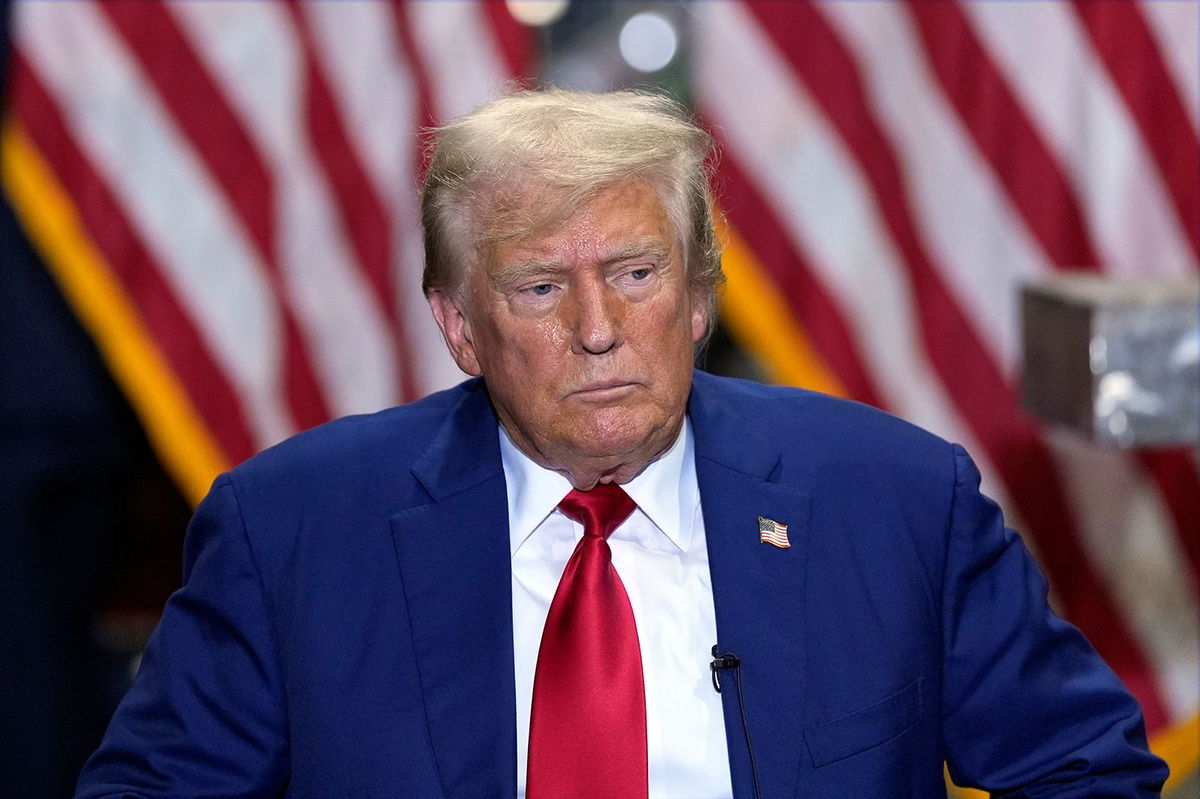NY appeals court to hear oral arguments on Trump’s $454 million civil fraud judgment next month

Republican presidential nominee former President Donald Trump listens at a business roundtable discussion at a campaign event at Precision Components Group
By Kara Scannell, CNN
(CNN) — A New York appeals court will hear oral arguments on Donald Trump’s appeal of the $454 million civil judgment against him on September 26 – making it unlikely the appeals court will issue a decision by Election Day.
Trump has asked the First Department appellate division to throw out Judge Arthur Engoron’s order finding him liable for fraud and ordering him to pay $354 million plus interest, which totals over $100 million.
In legal papers, Trump argues that no one was harmed, the judgment is unconstitutional and the case never should have been brought because the conduct is too old.
Trump posted a $175 million bond in April, after the appeals court lowered the bond amount. The bond paused any action New York Attorney General Letitia James’ office could take to take over properties or bank accounts.
In a court filing Wednesday night, the New York attorney general’s office urged a New York state appeals court to uphold state Supreme Court Justice Arthur Engoron’s verdict finding Trump, his adult sons and others liable for fraud.
The attorney general argued there was “overwhelming evidence” that Trump knowingly committed fraud and inflated the value of his properties on financial statements to obtain loans.
“This Court should affirm. Supreme Court’s liability determinations are supported by overwhelming evidence that, in each Statement, defendants used a variety of deceptive strategies to vastly misrepresent the values of Mr. Trump’s assets,” the attorney general’s office wrote.
The attorney general’s office argued that Trump’s lawyers’ appeal briefs largely avoided “any substantive discussion of the many different deceptive practices they used to vastly inflate the values of Mr. Trump’s assets on each annual Statement.”
“Instead, defendants focus their appeal primarily on meritless legal arguments about the elements of” the law, prosecutors wrote. “These arguments are contrary to the statutes text and settled precedent and should be rejected.”
The attorney general’s office alleged that Trump and others ignored “almost all their deceptions” as determined by the judge. Trump’s lawyers said that the attorney general failed to prove that the lenders relied on the misrepresentations when they loaned millions of dollars to Trump and that no one lost any money due to the alleged fraud.
Trump “indisputably participated in the fraud,” the attorney general’s office wrote.
As one example of a property that was inflated on the financial statement, New York prosecutors highlighted the valuation of Trump’s Florida residence at Mar-A-Lago. The judge found Trump inflated the value of the Florida estate on his financial statements. Authorities defended the ruling in the filing, saying, “Valuing Mar-a-Lago as an unrestricted private residence rather than as a social club inflated its value on each Statement by approximately $300 to $700 million, depending on the year.”
The state lawyers defended the early judgment as “reasonably approximated”of the ill-gotten gains the Trumps received as a result of the fraud.
“Extensive trial evidence, including expert testimony that Supreme Court was entitled to credit, established that $363.8 million reasonably approximated defendants’ illicit profits from their wrongdoing, and defendants failed to satisfy their burden to show otherwise,” the attorney general wrote. The judge also ordered interest payments that exceed $100 million.
Trump’s lawyers had argued most of the judgment should be thrown out because they related to loans that fell outside the statement of limitations, in addition to arguing that the judge double counted by also including profits Trump made from the sale of some properties. The attorney general’s office argued in its filing Wednesday that Trump was wrong.
“The interest rate savings and the sale profits were not mutually exclusive theories of recovery. Rather, as Supreme Court correctly explained, they each represent a separate category of ill-gotten profits that was causally connected to defendants’ use of the false and misleading Statements,” prosecutors wrote.
This story has been updated with additional developments.
The-CNN-Wire
™ & © 2024 Cable News Network, Inc., a Warner Bros. Discovery Company. All rights reserved.